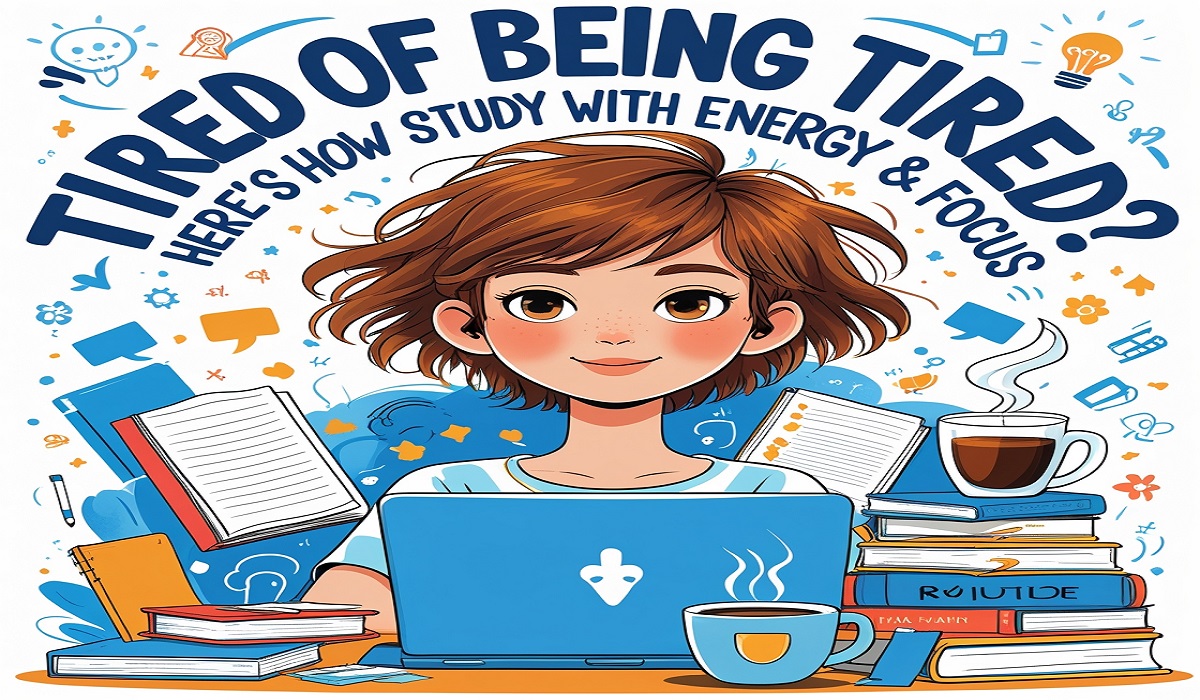How to Study with Energy & Focus
How to Study with Energy & Focus: Are you constantly feeling exhausted and struggling to focus on your studies? You’re not alone. Fatigue, lack of motivation, and poor time management are common challenges students face. But what if you could overcome these obstacles and study effectively right now?
In this comprehensive guide, we’ll explore science-backed techniques to beat tiredness, boost energy, and enhance concentration. Whether you’re preparing for exams, working on assignments, or just trying to stay productive, these strategies will help you study smarter, not harder.
Why Am I Always Tired? – Understanding Fatigue
Fatigue isn’t just about lack of sleep—it’s influenced by multiple factors:
- Poor Sleep Quality – Even if you sleep 8 hours, interrupted or shallow sleep can leave you exhausted.
- Stress and Anxiety – Mental strain drains energy faster than physical work.
- Sedentary Lifestyle – Sitting too long reduces blood flow, making you sluggish.
- Unbalanced Diet – Sugar crashes and nutrient deficiencies zap energy.
- Dehydration – Even mild dehydration causes fatigue and brain fog.
Signs You’re Too Tired to Study Effectively
- Difficulty concentrating
- Constant yawning
- Heavy eyelids
- Irritability
- Forgetfulness
If these sound familiar, keep reading for instant and long-term solutions.
The Science of Energy and Focus – How Your Brain Works
Your brain runs on glucose, oxygen, and neurotransmitters like dopamine and serotonin. When these are out of balance, you feel tired and unfocused.
Key Factors Affecting Mental Energy:
✅ Circadian Rhythm – Your body’s natural sleep-wake cycle.
✅ Adenosine Buildup – A chemical that makes you sleepy (caffeine blocks it).
✅ Blood Sugar Levels – Spikes and crashes affect focus.
✅ Neuroplasticity – Your brain’s ability to adapt and learn.
Understanding these helps you hack your energy levels for better studying.
How to Stop Being Tired Immediately – Quick Fixes
Need an energy boost right now? Try these:
Quick Energy Boosters
- Splash Cold Water on Your Face – Triggers alertness.
- Chew Gum – Increases blood flow to the brain.
- Power Nap (10-20 min) – Resets focus without grogginess.
- Caffeine in Moderation – Coffee or tea, but avoid sugar crashes.
- Deep Breathing (4-7-8 Method) – Oxygenates the brain.
Avoid These Energy Killers
- Scrolling social media (drains mental energy).
- Heavy meals before studying (causes sluggishness).
- Sitting in a dark room (signals your brain to sleep).
Long-Term Strategies to Stay Energized
If you’re always tired, you need sustainable habits:
Energy-Boosting Habits
✔ Fix Your Sleep Schedule – Go to bed and wake up at the same time daily.
✔ Exercise Regularly – Even a 10-minute walk boosts brain function.
✔ Hydrate Well – Drink at least 2L of water daily.
✔ Eat Brain Foods – Omega-3s, nuts, berries, and dark chocolate.
✔ Reduce Screen Time Before Bed – Blue light disrupts melatonin.
Best Study Techniques for Maximum Retention
Studying while tired is ineffective. Instead, use active learning methods:
Top Study Methods
- Pomodoro Technique – 25 min study, 5 min break.
- Feynman Technique – Teach what you learn in simple terms.
- Spaced Repetition – Review material over increasing intervals.
- Mind Mapping – Visualize concepts for better recall.
Time Management Hacks for Students
Poor time management leads to burnout. Try:
Productivity Tips
- Prioritize with the Eisenhower Matrix (Urgent vs. Important).
- Batch Similar Tasks – Group readings, assignments, etc.
- Use the 2-Minute Rule – If it takes less than 2 mins, do it now.
Nutrition and Hydration for Brain Power
Your brain needs fuel:
Best Foods for Studying
- Blueberries (antioxidants)
- Avocados (healthy fats)
- Eggs (choline for memory)
- Dark leafy greens (iron & vitamins)
Hydration Tips
- Keep a water bottle nearby.
- Add lemon for flavor and alertness.
The Role of Sleep in Academic Performance
Sleep > Cramming – Studies show well-rested students perform better.
Sleep Optimization Tips
- No caffeine after 2 PM.
- Keep your room cool and dark.
- Avoid all-nighters (they hurt memory).
Mental Health and Stress Management
Chronic stress causes fatigue. Try:
Stress-Reduction Techniques
- Meditation (5-10 mins daily).
- Journaling to clear mental clutter.
- Talking to a friend or counselor.
FAQs – Common Questions Answered
❓1. Why do I feel sleepy every time I study?
This could be due to boredom, poor lighting, or lack of engagement. Try active learning techniques instead of passive reading.
❓2. How can I study when I have no energy?
Start with 5 minutes of light exercise or deep breathing to wake up your brain.
❓3. Does caffeine help with studying?
Yes, but in moderation. Too much causes crashes. Green tea is a better option than coffee.
❓4. How many hours of sleep do I need to study effectively?
7-9 hours is ideal for cognitive function. Less than 6 hours harms memory.
❓5. Can music help me focus while studying?
Instrumental or lo-fi music can help, but lyrics may distract.
Conclusion
Fatigue doesn’t have to control your academic success. By optimizing sleep, nutrition, and study habits, you can boost energy and focus instantly. Start applying these tips today and see the difference!
